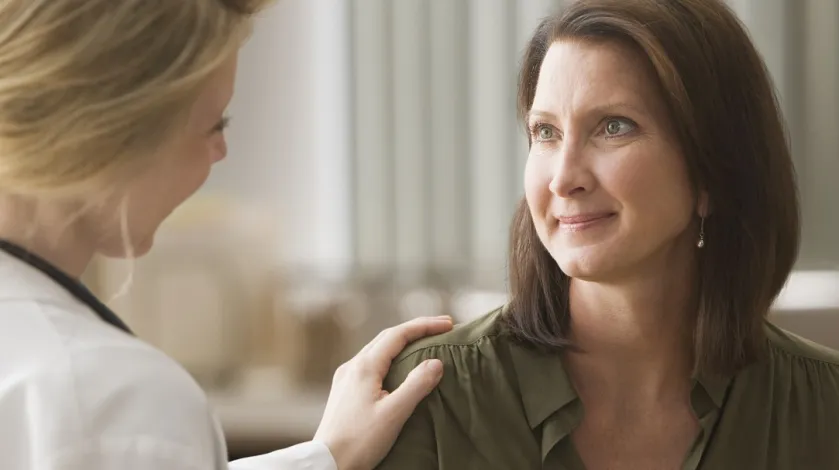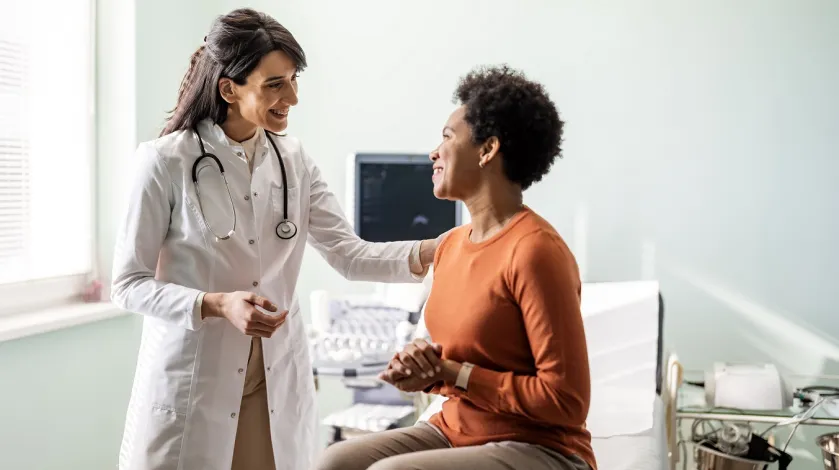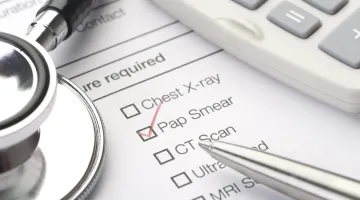Roll with the Changes – Eight Things to Know about Navigating Menopause
Author

Ingrid Kotch, MD, OB/GYN
Commonly referred to as the change of life, menopause is a time of transition women experience at midlife.
During this change, the ovaries produce lower levels of estrogen, which brings about an end to menstruation and fertility.
The drop in estrogen during menopause can bring about both physical and emotional changes for women, along with several bothersome symptoms.
Fortunately, there are medical treatments, lifestyle changes and self-care steps women can take to manage menopause’s more disruptive symptoms while making their way through this transition.
To learn more, we asked Ingrid Kotch, MD, the Chief of Obstetrics/Gynecology Ambulatory Care at the Women’s Center of South Shore Medical Center, eight questions about navigating menopause.
When does menopause start and how long does it last?
Menopause begins when a woman has had no menstrual period for 12 consecutive months. The average age for the start of menopause is 51, and it usually occurs between ages 45 and 55.
When menopause begins before age 40, it is called premature menopause. Premature menopause may be induced by having a hysterectomy or can occur naturally due to genetic, metabolic or autoimmune conditions. About 1% of U.S. women have premature menopause.
Perimenopause describes the 7-10 years leading up to menopause, when women may begin have irregular periods and experience other symptoms of menopause, including hot flashes.
Once menopause begins, symptoms generally persist for 3-5 years. The duration, type and severity of symptoms can vary greatly, with some women experiencing hot flashes for just a couple of months and others dealing with them for 7-10 years or more.
What are the most common symptoms of menopause?
Hot flashes, night sweats, sleep disturbances, mood changes, anxiety, brain fog, weight gain, vaginal dryness, painful intercourse, lack of libido, urinary tract infections or incontinence are among the symptoms women may experience during menopause.
Every woman’s journey through menopause is unique. Not everyone experiences the same symptoms, which is why treatment is very individualized.
What are some unexpected menopausal symptoms women may experience?
Some of my patients have reported they have joint pain, which like other menopause symptoms may be linked to lower estrogen levels.
Hair loss and skin dryness are two other less common menopause symptoms I hear about. Both can be related to other medical conditions, including hypothyroidism and anemia.
What are some medical treatments to ease menopause symptoms?
When it comes to menopause, there are different categories of symptoms and that determines what type of treatment is needed. The primary categories include:
- Vasomotor symptoms (hot flashes and night sweats) and sleep disturbances
- Genitourinary symptoms such as vaginal dryness and painful intercourse
- Anxiety and depression
Hormone Replacement Therapy (HRT), also called Menopausal Hormone Therapy, is effective for treating most symptoms of menopause. Hormone therapies are prescription medications available as pills, patches, creams, gels, sprays or a vaginal ring.
Estrogen therapy is prescribed for women who don’t have a uterus. Women with a uterus are given a combination of estrogen and progesterone, which protects the uterus from endometrial cancer.
For vasomotor symptoms, the medications can be used systemically to deliver hormones throughout the body. Localized hormone therapy including pills, creams, or a vaginal ring, specifically targets vaginal symptoms including dryness or painful intercourse due to the thinning of vaginal tissue.
HRT is recommended for women within 10 years of the start of menopause or before age 60.
HRT is not for anyone who had estrogen-related cancers such breast or uterine cancer, significant heart disease, blood clots or a family history of blood clots.
For patients who are not good candidates for hormone therapies, or prefer not to use them, there are other options including anti-anxiety medications known as selective serotonin-reuptake inhibitors (SSRIs) and newer, non-hormonal medications, which have been found to be effective in treating sleep disorders, anxiety, mood changes and hot flashes.
What are the concerns/risks with hormone replacement therapy?
While hormone therapy effectively treats many of menopause’s disruptive symptoms and has the benefit of preventing bone loss, there are risks associated with its use, including breast cancer, coronary disease, stroke, heart attack and deep vein thrombosis (DVT) blood clots.
The breast cancer risk grows with age and longer use of hormone therapy – more than 3 to 5 years for combination therapy of estrogen and progesterone, and more than 7 years for estrogen alone.
But most recent data has shown that the benefits of HRT, when used within 10 years of the start of menopause and before age 60, outweigh the risks.
Side effects when starting hormone therapy can include skin irritation (if using the patch) headaches, breast tenderness, and bloating. Women who still have a uterus may experience spotting (similar to a period). These side effects generally resolve within a couple of months.
How to best manage a patient’s particular symptoms is a discussion I have with everyone. Treatment is not “one size fits all.” It’s very individualized because everyone’s risk/benefit ratio is different.
Are there natural remedies/herbal supplements that are effective for menopause symptoms?
There aren’t any studies that definitively show natural treatments are effective for hot flashes and other symptoms women experience during menopause.
While some women may find relief for a short time using certain herbal or botanical supplements, it may be due to a placebo effect. There is limited or mixed evidence that products such as Evening Primrose Oil, Ginseng or Red Clover reduce hot flashes.
It’s important to remember these products are not regulated by the FDA and research shows that some may be potentially harmful.
For instance, liver toxicity has been reported with the use of Black Cohosh and the Chinese remedy Dong Quai has been found to cause sun sensitivity, act as an anticoagulant (blood thinner) and contains chemicals that may cause cancer.
There is also a concern about possible interactions these herbal therapies may have with prescription medications. Patients should always speak to their healthcare provider before starting a new supplement.
How important is nutrition and maintaining a healthy/active lifestyle during menopause?
It’s very important.
A balanced diet that is low in saturated fats and processed sugars and high in fruits, vegetables and lean protein, can help you maintain a healthy weight. Weight gain can be a huge struggle for menopausal women.
A healthy diet may also help with hot flashes and night sweats. For some women, alcohol, caffeine, hot drinks and spicy foods may trigger symptoms or make them worse, so they should avoid them or limit consumption -- particularly before bedtime.
Eating a diet rich in calcium and vitamin D or taking supplements can help maintain strong bones.
Exercise – particularly weight bearing activities like walking and strength training – is also important for preventing bone loss and good for weight management.
Sleep disorders and night sweats can make getting a good night’s sleep difficult during menopause, but practicing good sleep hygiene can help.
Try to establish a routine bedtime and before retiring for the night, disconnect from electronics including television and your phone, which can be stimulating. Instead, wind down with relaxing activities like reading, gentle yoga, meditation, or deep breathing exercises.
Create a restful sleeping environment by keeping the room at a cool, comfortable temperature and the lights low.
If you have trouble falling asleep because there is too much on your mind, empty your brain before you go to bed by making a list of the things you need to do the next day so you’re not thinking about it all night.
What advice do you give patients as they navigate the menopause transition?
Menopause is a not a condition or an illness – it’s a natural change and it doesn’t have to be a negative point in anyone’s life. In fact, there are benefits that can make this a freeing time for women; there are no more menstrual periods or premenstrual syndrome (PMS) symptoms to deal with, fibroids can shrink and there is no worrying about unintended pregnancy.
Women should know menopause is a safe thing to talk about and there is less of a stigma today than there once was. They also should know that they are not alone – most women experience some effects while going through menopause.
Women should not be afraid to speak to their healthcare provider about any symptoms they are experiencing and discuss an individualized treatment plan to manage them effectively.
Ingrid E. Kotch, MD, is the Chief of Obstetrics/Gynecology Ambulatory Care at the Women’s Center of South Shore Medical Center and a member of the North American Menopause Society (NAMS). Learn more about women’s health at South Shore Health.
Author

Ingrid Kotch, MD, OB/GYN








